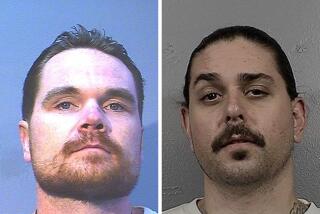Inmate Whose Transplant Caused Furor Dies
- Share via
SACRAMENTO — A California prisoner whose heart transplant a year ago caused a wave of outrage over state-funded inmate health care has died, apparently because his body rejected the organ, corrections officials said Tuesday.
The 32-year-old inmate, whose name was not released, died Monday night at Stanford University Medical Center, where he had been listed in critical condition for about two weeks and on life support more recently, officials said.
A hospital spokeswoman said the cause of death was heart failure but would not provide details, citing patient confidentiality. Corrections officials said an autopsy would be performed, probably this week.
“It appears that the inmate’s body had been rejecting the heart,” said Stephen Green, assistant secretary of the state Youth and Adult Correctional Agency. “He began having problems earlier in the fall, and they became progressively more serious.”
The inmate -- the first California convict to receive a heart transplant -- was serving a 14-year sentence for a 1996 robbery in Los Angeles. At the time of his sentencing, he was suffering from a viral heart infection, which led to a gradual degeneration of his heart muscle.
About a year ago, he suffered congestive heart failure and was taken to Stanford, where he was kept alive by a machine that makes the heart beat mechanically. Hospital officials determined that a transplant was medically necessary, and the surgery was performed Jan. 3.
The operation and subsequent care cost the state $913,000 through the end of October, a sum that excludes the inmate’s most recent treatment at Stanford.
After news of the transplant surfaced, critics questioned why taxpayers should foot the bill for such an elaborate procedure -- and why a convict should receive a new heart when other, law-abiding patients were in line for an organ.
Though heart transplants have become a routine procedure because of the introduction of drugs that block the body’s effort to reject transplanted tissues, a shortage of available organs remains a barrier. At the time of the inmate’s surgery, there were 4,119 patients on the waiting list for a donor heart, according to the United Network for Organ Sharing.
Green said the inmate was placed on the network’s list of patients needing transplants, and was selected according to criteria that include whether a patient will die without a transplant and the proximity of a donor to a recipient. The criteria do not include whether a person is in prison, and bioethicists argued that barring someone on such grounds would amount to playing God.
Moreover, Green said, the state was compelled to provide the transplant by a 1976 U.S. Supreme Court decision that found that denial of decent medical care to prisoners violates the Constitution’s prohibition against cruel and unusual punishment. That decision laid the foundation for another court ruling, in 1995, ordering California to give an inmate a kidney transplant.
“The courts have set medical policy for us and have said that we must meet the needs of our inmates,” Green said, “and so we will.”
He said he knows of only one prisoner now in the system who may become a candidate for a transplant in the near future. But many inmates suffering from hepatitis C could at some point need kidney transplants. “I’m sure that’s coming,” he said.
The heart transplant patient had done fairly well after the surgery and was taking anti-rejection drugs, officials said. He had been in the hospital unit at the California Medical Facility in Vacaville since the transplant.
Statistics show that about 86% of patients survive the first year after a heart transplant, with survival declining to about 70% after five years.
More to Read
Sign up for Essential California
The most important California stories and recommendations in your inbox every morning.
You may occasionally receive promotional content from the Los Angeles Times.













